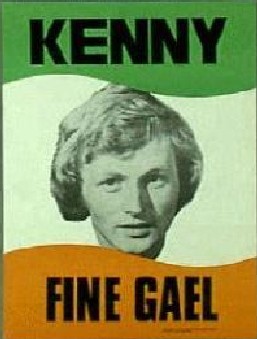Jason Walsh explains why he won't be voting in tomorrow's Irish general election.
Tomorrow men and women across Ireland will dutifully trudge to the polling booth – and resist the urge to poke themselves in the eye with the pencil. Whether or not they choose to engage in self-harm, it's a dead cert that the new government will dole out plenty of pain once it is in power, but given Irish polticians have abdicated responsibility for, you know, running the country to the EU it scarcely matters who will win the election.
Journalists from across Europe have descended on Ireland in the last week and are, bless them, desperately trying to make Irish politics fit into a framework that they understand from back home. Sadly it just doesn't work. How come after fourteen years of conservative government, the people are about to vote for an even more conservative government?
“Aha!,” they say, “the Irish are voting for personalities, not policies.”
Well, maybe some are, but the personalities on offer aren’t exactly inspiring stuff.
“The Irish people are innately conservative,” others muse.
Not so. Firstly, Irish people have shown their radicalism on plenty of occasions, secondly, only a conservative would argue that a nation's politics exist in some kind of essential, fixed state.
In reality, the Irish are masters at making a virtue out of necessity, such as pretending there is something up for grabs in an election with few real choices on offer. Those who fear Fine Gael will unleash a reinvigorated right-wing reaction are mistaken, while those who fear the election will mean left wing government are… delusional.
No matter who wins, the ECB-IMF bailout deal and its consequences of cuts, cuts and more cuts will define the next government. The finance bill that enacted the bailout was officially opposed by Fine Gael and Labour but this was mere grandstanding. In reality, the two parties did all they could to ensure it was passed into law before Brian Cowen’s Fianna Fáil-led government collapsed.
There is a deeper malaise, too, at the heart of Irish politics. The settlement of the "Northern Question" – at least as far as polite society is concerned – means both Fianna Fáil and Fine Gael are suffering a deep existential crisis. The sole reason for the existence of these twin conservative parties was the matter of the partition of Ireland: those who later became Fine Gael supported it (temporarily, they claimed) while those who opposed it became Fianna Fáil.
The complaining about Sinn Féin in the election campaign has more to do with fear and disgust at the sight of a party that stands for anything ideological at all (however diminished) than it has to do with any believable horror at the IRA. If the IRA is still an issue in Irish politics, then why did all parties support Sinn Féin's ascension to power in the North of Ireland? Moreover, how come former Fianna Fáil leader and Irish prime minister Bertie Ahern accepted the fact that the IRA has disarmed?
All of which may or may not be interesting, depending on how much a political trainspotter one is, but what is much more important is understanding the fact that the terms of debate in Irish society have contracted to the point where the difference between the parties is marginal at best. Never home to a real battle of ideas, the collapse of the last remaining unsettled issue has left Ireland with plenty of politicking but little that we might recognise as genuine politics.
Fianna Fáil and Fine Gael resemble nothing so much as the same side of the same coin and Labour has been reduced to a party arguing for somewhat fewer cuts while still accepting that the immediate future will be austere.
As for me, I shall not be voting. I did briefly consider voting for Sinn Féin solely to annoy the good burghers of south county Dublin, but decided that there were better ways to express childish resentment, for instance by, exposing the rank hypocrisy built-in to Irish politics.
There are those who say that if you don't vote, you lose the right to complain.
This is, of course, a lie.
Specifically, it is a lie perpetuated by people whose narrow conception of democracy begins and ends with the ballot box. The inspiring scenes from the Arab world should remind us that politics happens not only in the polling booth, but in the streets and in the public sphere. How lucky we in the developed world are that not only can we take to the streets but that we can also express ourselves through freedom of association and freedom of speech.
Voting is an important right, of course, but there is no obligation to hold one's nose and vote for a party that we don't actually support.
So, instead of voting for which flavour of dressing I'd like on my bland sandwich tomorrow, I shall instead smoke a few Gitanes and listen to French rock and roll. Politics, in the sense of arguing over the shape of future, will resume after the poll and the next election may yet be an important one, but what's been going on recently isn't politics, it's politiczzzzzzzzzzzzzz.
Was this article useful? If so we are delighted!
It is freely available because we believe that the right to free and independent information is essential for democracy. But this right is not guaranteed forever, and independence comes at a cost. We need your support in order to continue publishing independent, multilingual news for all Europeans.
Discover our subscription offers and their exclusive benefits and become a member of our community now!












